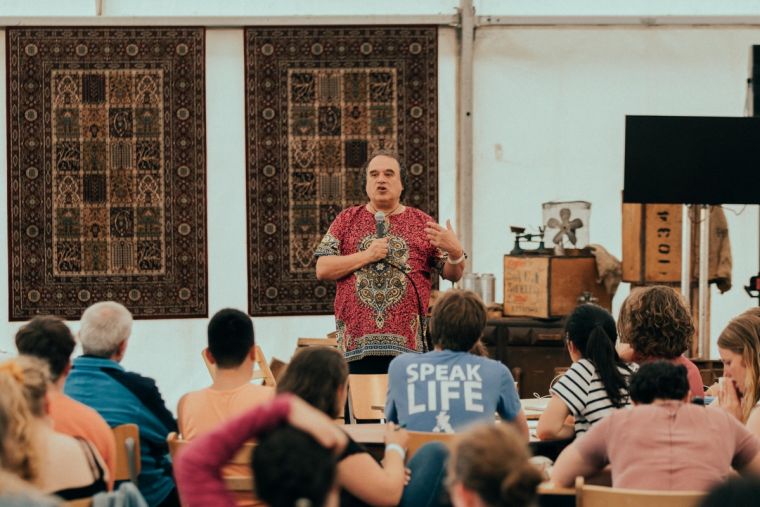Mike Pilavachi on the end of Soul Survivor and the start of the next chapter

Each summer for nearly the last three decades, Mike Pilavachi has poured his heart and soul into tens of thousands of young Christians at the Soul Survivor youth festivals.
It was with great sadness, then, that many Christians received the news last year that the 2019 Soul Survivor would be the last.
At the age of 61, he tells Christian Today that it's time to hand on the baton to someone else, and he has every confidence that something new and even better will take its place.
It may the end of the Soul Survivor festival, but it's not the end of Soul Survivor the movement, and his work in pastoring and youth ministry continues.
His most recent publication is Storylines: Small Group Edition, based on his 2010 book Storylines, co-written with Andy Croft, which explains the great themes of the Bible, from Genesis to Revelation.
He talks to Christian Today about the end of Soul Survivor, his plans for the future, and why, after so many years, he hasn't lost his zeal for God's Word or the sense of "privilege" he feels in teaching it to others.
CT: We're the most resourced generation of Christians and yet it seems like we still wrestle with God's Word as much as ever. Is that just a natural part of the Christian faith and being a Christian?
Mike: Understanding God's Word is a bit like beetroot in that it's more-ish. The more you eat it, the more you like it and it becomes your friend.
For young people in particular, there can be a fear of the unknown and a sense of: where do I start?
We made Storylines to explain the great themes of the Bible from Genesis to Revelation, and to show that there is a coherent theme.
The challenge is to understand what we are reading and yes, we are very resourced, but it's only a small minority of Christians who actually use the resources; most don't.
And there is a bit of a mental block when it comes to the Old Testament. How do I make sense of it? How does it all hang together? When people see the themes that culminate in Jesus, then it's like oh, wow, they were here all along. They see these great themes running through the Old Testament and that makes it is easier to read.
It's hard to turn to Deuteronomy when you have no idea of the context. For many, when they just get a bit of understanding, that is enough to whet the appetite.
CT: You mention the many Christians who don't use the resources that are out there. How do you think they can be encouraged to use them? Or do you think it is simply the case that there will always be those who use them and those who don't?

Mike: People engage when they are interested, when there is a hunger, and when they see the need. We do things either because they're pleasurable or because we want to 'pass the exam'. There has to be a motivation.
Our job as church leaders is to be praying for people, that there would be a hunger that grows and a desire to get to know Him. And then we need to teach faithfully that one of the major ways you get to know Him is through His Word.
Folk also need to be aware of the resources that can help them to begin their journey in the Bible and help them understand the context of the Bible, because for us, we are so removed from the culture of both the Old and the New Testament.
In a sense, for those who lived in those days when the Scripture was written, it was much easier because it was their culture. We have to help people understand the great story.
At Soul Survivor, we have tried every way! We have written Storylines about the themes, Lifelines about the characters and how they relate to us today; we've recorded the Gospels for people who aren't very keen on reading and would prefer to listen to the Scriptures; we've got the Soul Survivor Youth Bible and Bible in a Year videos. We've tried everything!
The main context for learning is in the church because I passionately believe in the church to explain it all in as winsome a way as possible and because many, for one reason or another, struggle on their own. The book and video resources are designed for groups so that the church can say, 'hey, let's explore this together.'
And it is so powerful. When you actually see the whole theme of the covenant; that God made a covenant, a solemn binding oath that He would never let go of us and that He would be committed to us come what may, it's amazing and I hope that in the end it makes you want to worship Him.
CT: You pastor a largely youth church. Whether rightly or wrongly, young people today have a bit of a bad rep for being glued to their screens and smartphones, but do you find that there is a hunger among the young people that you are pastoring to sit down and dig into God's Word? Or have you found it is a bit of a struggle?
Mike: It's both; it's not all monolithic. Our church is every age now, we have lots of young people but also lots from other ages. And with the young people - as with everyone really - with some it's easy, while others struggle a bit more.
This is why we have to do the discipleship process because after they come to the Lord, then we want to go on a journey with them and we want to do it in relationship because that's what makes the difference.
I think once folk are in the Word for a while, the Bible becomes their friend and companion; it becomes familiar. The problem is when you have young people who have given their life to Jesus based on lots of feelings of His love and it doesn't go beyond that. It's not bad to come to faith because of having these feelings of His love, but if it doesn't go beyond feelings and get rooted in truth, then when the feelings go there's nothing left - and the feelings do go, because feelings are unreliable, as we all know.

So it's a mix. We have folk who love the Word and reading the Word together, the young people in their youth groups, the adults in their Connect groups. But it's not everyone because everyone is on a journey.
Our job as leaders is the discipleship process; to do everything we can to do encourage the people in our churches, to help them, whet their appetite and model it ourselves.
When we get excited about Jesus from the pulpit then they'll get excited. If His truth is not alive in us, then others can see that. We are the ones who set the tone.
CT: You're doing the last ever Soul Survivor this year. How do you feel about that? Is it a little bit bittersweet or sad?
Mike: Everyone's been asking me this question and the honest truth is: it isn't! It's not been difficult at all. [laughs]
I have wondered if on the last day I will feel a bit sad but we really believe that God spoke to us and told us to stop, and when you really know that, then it's easy.
This will be our 27th year and I'm 61 now! We're expecting up to 30,000 people including day visitors. It's 26 days of festivals - every summer! So that's quite a big responsibility - and when you're my age! [laughs]
I have loved seeing God at work and people coming to know Jesus; that is such a privilege. We have loved the young people and I will miss seeing them in that setting. But we absolutely know it's right and we said years ago that we hoped that one day, when God said stop, we would hear him and stop.
God never said He'll build my Soul Survivor, He said, "I'll build my church." And we've existed for a season to serve the Church; now we're handing on the baton, others will take it on and do a better job.
I hope we have been faithful to what God has called us to for this season. I hope that more than feeling a bit sad on the last day we'll feel joy because we can say, "We did it Lord, we did what You told us. Look what You've done again this summer, look at the blessings."
CT: So have you got anything that's filled that 'hole' left by Soul Survivor ending or are you just enjoying being a pastor?
Mike: We're not going to stop, we're still going to have our monthly celebrations at church. As long as they still want to come, we're committed to training young people for leadership and it's not as if we're stopping ministry.
But there are two things really: we believe God has called us to serve the local church because that is where it all happens. One of the hardest things about the festivals is seeing young Christians come alive in their faith and then go back to local churches and really struggle.
So we want to serve local churches. We know that many local church leaders have a tough time and there are two areas in particular we want to work. We want to help them grow in what we call naturally supernatural ministry - that means being open to the ministry and power of the Holy Spirit in a way that's natural and not weird and doesn't put off non-Christians but actually draws them in.

When the Holy Spirit has been given room to move; when we've prayed for people and seen things happen when God has spoken, and it's genuine and authentic and not hyped or manipulated, when it's biblically based, then it draws non-Christians in, because for them their thinking is, 'well, if there is a God, then of course He would be powerful wouldn't He?!' They're not surprised, it's normally the more religious that struggle.
The other area is to help churches - and to model to them - how churches can grow on family principles as opposed to business principles. Much of the stuff you get at church leaders' conferences these days is from megachurch leaders who mainly talk about their 'techniques' and this sort of approach.
But one of the many pictures for churches in the Scripture is family. In business you hire and fire employees; in a family you raise up sons and daughters. If all the big churches want to do is hire the finished product and the people who are the most gifted and most accomplished, then we're not raising anyone up. We've got to raise people up, and in order to raise up sons and daughters, we've got to raise up mothers and fathers.
Paul said to the Corinthians you have 10,000 teachers, you do not have many fathers. We've got to actually help people to see that there is an amazing joy in raising up and investing in young men and women. It's what Jesus did with the disciples. He didn't go to the top rabbinical colleges of the day and pick the best of the best and say, "Come, follow me."
He went to the Sea of Galilee and picked 12 morons and invested in them, raised them and committed them and these people - well, 11 of them - changed the world. We want to practically encourage, help and coach church leaders to do that because it is so rewarding. That's the future.
CT: You've talked about the fact you're 61 and been doing Soul Survivor for 27 years, so you're in an older season of life now. Looking back, what's the lesson you've learned from all your years of ministry?
Mike: Oh my word, there's lots! I think what I've learned is that God is faithful despite our mistakes and so often when I look back, I think, 'oh my word, Lord, how did You do that? You were in that all the time, why didn't I trust You more?'
And I've also learned the importance of obedience. It's God's love language - "If You love me, You'll love my commands."
Just learning to listen and to obey, that's the place where You have the greatest intimacy with Him and see Him to do wonderful, miraculous things. You see that in the Scripture and You see that also in the lives of the folk that God has used over the years, whether it's Hudson Taylor or George Mueller of Bristol, or William Carey. Just obedience.
It was William Carey who said, "Attempt great things for God, expect great things from God."
It's about trusting His character, that He is for us, that He is a Father that wants to equip us to change the world, and that He roots for us, that He's not some old-fashioned head teacher looking for reasons to fail us. He wants us to succeed.
The thing I've learned the most is to trust Him, His character, His nature, His will, His purposes, and that He works all things together for the good of those who love Him. That's the lesson I've learned.











